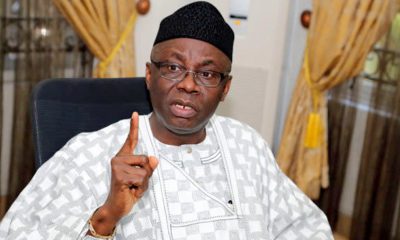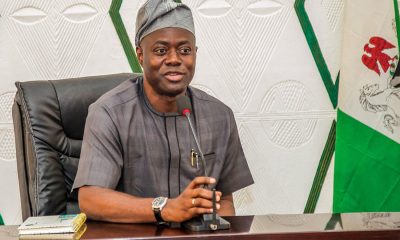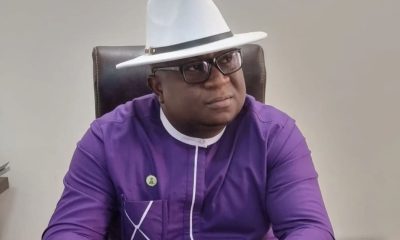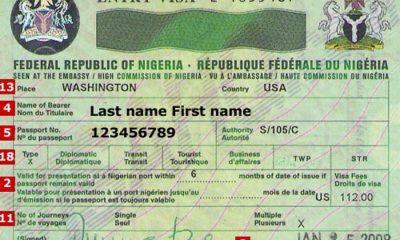Opinion
Travelling through Nigeria in Tinubu’s yacht, by Tunde Odesola

Travelling through Nigeria in Tinubu’s yacht, by Tunde Odesola
Published in The PUNCH, on Friday, November 17, 2023.
By the Rivers of Babylon, there I sat down; yeah, I wept, when I remember N-i-g-e-r-i-a. Verily, verily I say unto you, these words that I write, are words of redemption and wisdom.
Therefore, I beseech you, brethren, to keep these words in your hearts, inscribe them in stones and scribble them on scrolls.
I exhort thee, keep the stones and scrolls, do not hide them under the bushel, set them on the hill for light to shine on them and bring people to know the truth, for only the truth shall set the land free.
Like the hands of a sinner spread wide on the cross, River Niger and River Benue divide the land called Nigeria into three unequal communities of the North, West and East. The Fulani dominate the North, the Yoruba have the West, and the Igbo populate the East. Each region and people had their strengths and weaknesses. The land knew peace.
But when political iniquity became official, and the supplications of the oppressed minorities rose to the ears of the Most High God, the portion of the land that flows with oil, milk and honey became gazetted as the Niger Delta, a vast treasure that was initially part of the eastern and western regions.
And the Lord regretted creating man because the heart of man was perpetually evil. So, the spirit of the Lord hovered upon the face of the waters, inspiring patriots to call traitors to repentance and justice.
It came to pass that there arose a mutiny within the Nigerian Army when some young, idealistic officers, mostly from the East, toppled the civilian government of Alhaji Tafawa Balewa, a northerner, who was killed, and an easterner, Major General Johnson Aguiyi-Ironsi, ruled in Balewa’s stead. The January 1966 coup broke the embankment that had dammed the river of hate and suspicion from flooding the country.
READ ALSO:
- Police clamp down on ‘one chance’ syndicates, parade 8 among 135 arrested criminals
- Osama bin Laden’s ‘letter to America’ after 9/11 promoted by TikTok influencers, goes viral
- Kogi poll: Dino Melaye denies seeking refund of vote buying money
Six months later, a countercoup executed mainly by Hausa-Fulani soldiers was nicknamed a revenge coup, in which Aguiyi-Ironsi was killed. The fallout of the countercoup fed fodder to the cannons of a Civil War, which boomed between July 6, 1967, and January 13, 1970, as crazed soldiers played football with three million Igbo skulls felled by battlefield bullets, ethnic cleansing and starvation.
In anger, the Lord God of Host turned his eyes away from the people and the land, and He allowed jackboots in military uniforms to chastise them with scorpions because the innocent blood of coup victims and Biafrans refused to drain into the earth.
Here are the names and surnames of the rulers of Nigeria after the Civil War, in order of their ascension. Yakubu, the son of Gowon; Murtala, the son of Mohammed; Olusegun, the son of Obasanjo; Shehu, the son of Shagari; Muhammadu, the son of Buhari; Ibrahim, C the son of Babangida; Ernest, the son Shonekan; Sani, the son of Abacha; and Abdulsalami, the son of Abubakar. All these rulers ruled in the Old Testament.
But Babangida was wiser than a snake. Indeed, he was a deceiver extraordinaire. His bright smile has the cooling effect of iodine on a fresh wound, before the stinging pain. For is it not written that Babangida’s regime was the bloodiest in the 63-year history of Nigeria as many soldiers died in alleged coup plots while 163 senior soldiers died in a plane crash on September 28, 1992?
“They got me,” were the last words of Dele Giwa, the Editor-in-Chief of Newswatch magazine after a letter bomb blew open his entrails in his Ikeja home on October 19, 1986, shutting his eyes in brutal death. Giwa’s deputy and comrade-in-pen, Ray Ekpu, described the killing as ‘state assassination’, adding that the Friday preceding the Sunday Giwa received the letter bomb, he (Giwa) was grilled by the State Security Service, which accused him of ‘arms importation, planning a socialist revolution, doing a follow-up story on Commodore Ebitu Ukiwe, who had been removed by President Babangida, and planning to employ a former Lagos Police Public Relations Officer, Alozie Ogbugbuaja, who said the expertise of the Nigerian military top brass was in drinking pepper soup and planning coups. Ekpu said Giwa was only guilty of one of the four allegations, that is, planning to employ Ogbugbuaja.
After he annulled the June 12 presidential election won by MKO Abiola in 1993, and the backlash thereof was unbearable, Babangida planted on the throne, Sonekan, who was blown out of power by the hot air from the nostrils of Abacha. Abacha ruled for just four and a half years before karma handcuffed and flung him into the bottomless pit reserved for the shameless. Nothing confirms the looting of public treasury by successive Nigerian governments than the unending return of billions of dollars stashed in foreign countries by Abacha. Remember, Abacha spent just four and a half years in the vault and he became the Glutton of All Time!
READ ALSO:
- 69-year-old retired Oyo perm sec murdered at her Ibadan residence
- Lone PDP member in Yobe assembly defects to APC
- Disappointment as Lesotho hold Nigeria to 1-1 draw in World Cup qualifying opener
I am a full-blooded Nigerian. I have no family roots in Niger Republic like Buhari, or ancestrial link to Mauritania like Peter Obi’s presidential running mate, Datti Baba-Ahmed. Nigeria is my only home. I feel anguish daily when my hands hit the bottom of my empty trouser pockets, groping for unavailable naira, whose value equals the clap of thunder to the deaf.
Hope is dead in Nigeria’s New Testament. The testament of the latest Republic. Obasanjo’s civilian government opened the floodgates of corruption in the electricity sector, the privatisation process and the National ID card scam. Governments, thereafter, stirred the broth and served the booty, strangulating the economy.
Sadly, the chickens are back home to roost. Now, everywhere you turn, cries of economic hardship have taken over the land even within the Emi Lokan ruling party. Curses have replaced compliments. But me, I thank God I still have my mind intact. Many Nigerians don’t. Whenever I see any of the corrupt clique of 99.9% Nigerian leaders – former or present – I say in my mind, “Look at this one, it’s only God that knows how much of Nigeria’s money that this thief has stolen. Ole!” Treasury looters know what Nigerians think of them but they’re just shameless and unperturbed because the river of justice in the land has frozen.
The economy is gasping. Fathers have turned to beggars, and wives have turned to harlots. Children are deflowered for a bite of Gala. Commodity prices reside in the sky. Yet, our President buys a $6.1m yacht, and our senators and representatives crave N58bn SUVs, all living the life depicted in Luke 12:19, “And I will say to my soul, ‘Soul, you have plenty of grain laid up for many years. Take life easy; eat, drink and be merry.’”
Brethren, look closely at the pictures of their merriment, the voter is missing. So, tell me, what does it profit a voter, who supports bàráwò candidates, and is dehumanised after elections?
When the earth brimmed with iniquity, Noah stood up to be counted for righteousness. He built a three-deck ark with gopherwood and ushered in two of every kind of living creature, including the members of his family.
When Nigeria brimmed with escalating prices of goods, soaring foreign debts, double-digit inflation, and starvation, Tinubu, lawmakers, ministers and members of the ruling class tightened the belts harder on the masses. To cater for the insatiable gluttony, they have demanded underfunded federal universities to submit 40% of their meagre IGR to a federal purse which, characteristically, would lack accountability.
You don’t need righteousness to enter the presidential yacht. You need a brainless head and a soulless body. You need to make money your god and not flinch to proclaim all the seven colours of the rainbow black – like our judges who sell elections like pure water hawkers in traffic snarls, smashing and grabbing, kówó sá ti pe.
I thank God I have my mind intact. In my mind, I can see Noah in his robe, hewing wood and fetching water, sweating, sawing and nailing. I can see him clutching a bell, trekking the length and breadth of the land, calling the people to come and enter the ark. Noah’s ark is for salvation.
Tinubu’s yacht is for enslavement. He doesn’t need gopherwood or God’s directive to build his yacht, he needs dollarhood. He doesn’t need the masses inside his toy, he needs his people.
Barely a month left in 2023, the year of his election, Tinubu has bought a yacht for himself, SUVs for lawmakers, with the $2.176 trillion 2023 Supplementary Appropriation Act he signed a few days ago, and the masses are left wondering ‘is this not the ‘son’ of Abibatu Mogaji, who claims to build modern Lagos? Emi Lokan doesn’t only mean ‘it’s my turn’; it also means ‘I’m badly hit’. Ask the Yoruba.
True, it’s Tinubu’s turn but the masses are badly hit. True.
Since Tinubu performed so well in his first year, may he sail safely in his yacht and perform much better next year.
Amen.
Email: tundeodes2003@yahoo.com; Facebook: @Tunde Odesola; X: Tunde_Odesola.
Opinion
Islamic Forum: Essentially, who is the successful person on earth? By Afis A. Oladosu

Islamic Forum: Essentially, who is the successful person on earth? By Afis A. Oladosu
It was only a couple of days ago. I was busy as usual, and as expected of any believer, reading and rereading the Qur’an to discover, not how knowledgeable I was of and about its inner contents and latent meanings, but how ignorant I remain of its wonderful world. Yes. I am always happy to plead my ignorance of the emeralds and treasures that nest in each word and each ayat (sign) in the Last Testament (The Qur’an).
I know that no single exegesis and not one exegete has succeeded in explaining what, for example, the letter ‘Wa’ or the letter ‘Sin’ in the Qur’an means and could mean. Whenever you come to Chapter 36 of this wonderful scripture and you read Yasin, the only choice it offers you is to bask and bounce in the unknowability of its real import and signification.
In other words, despite their best efforts, the Qur’anic exegesis of al-Asyuti, Ibn Kathir, Fakhr al-Din al-Razi, al-Zamakhashari, and others are incurably far behind the inexhaustible data about and of this world furnished by the Qur’an, especially in relation to the continuities and changes in the contemporary period. Whereas the letters and the semiotics of the Qur’an remain unchanged and unchangeable, we are therefore fated, and perpetually too, to seek new meanings from our realities while being guided by divine ministrations.
Thus, it came to pass that I found myself in Surat Hud, ayat 108 where the Almighty says: “And as for those who are successful, they shall abide in paradise as long as the heavens and the earth endure; unless Your Lord may will otherwise…”. As soon as I read this ayat, my mind became flooded with a series of questions: essentially who are the successful ones? How can I be one of them? How do we determine success here on earth and what parameters has the Qur’an laid down with which extraterrestrial success would be determined?
The above question became urgent for me when I remembered those things usually considered as indices for earthly success in our world today. To be successful, today, as it was many years ago, is to have huge material comforts; and to have large families – children: boys and girls. To be successful is to have huge bank balances; to be an owner of big estates; to be the consort of beautiful women in the city.
READ ALSO:
- FG announces 2025/2026 overseas scholarship for graduates (See how to apply)
- Man beats brother’s wife to death in Jigawa
- Niger Gov Bago makes U-turn on dreadlocks ban after backlash
Yes. Earthly success is also often determined by status – being the CEO, the manager, the CMD. They are deemed successful those we refer to today as your excellencies, the (dis)honourables, your majesties etc.
Earthly success is also associational in nature. Whereas a man may have less than his friends, he may, however, consider himself successful having friends with big ‘fat pockets’, heads of corporate organisations and leaders in public governance. Our sense of self-worth is often a function of what they are worth; who is she, who is he, who are they! We glorify ourselves in the illusion of our ‘’closeness’’ to people in whose reality we are worth nothing!!!
Taken together as a problem, it is axiomatic that earthly successes, especially those defined by humans using others as parameters, are soapy, greasy and slippery. They are contingent, not immanent; just like sexual gratification, they depend on their realisation, the presence or intervention of the other who could be a compassionate benefactor or a querulous iniquitor.
Earthly successes are also transient. They are fated to the incertitudes and vicissitudes of time. What you consider a factor of success today could be a factor for failure tomorrow. Status and stations of life that often give false notions of terrestrial successes are usually ephemeral and transient.
Then I remembered my village. I remembered our fathers and their fathers, who considered themselves successful each time they contemplated how large their families were. I realised that they were no longer there in our homestead. The last time I went there, the question that crept into my mind was – “where are we?”
Many decades ago, we were over 30 children living together, and happily too, in that compound. But today, we are no more there! Our big compound has become a mansion for lizards; they have become boulevards for ants and termites! We have left our past behind us. Or rather, the past has left us for the future! Or rather, the Owner of the past and the present has caused that familiar and inimitable change such that what constituted success in the past no longer finds any bearing and meaning in the present
Where then lies permanent success? It lies, unequivocally, in holding firmly to the fundamentals of our faith in line with Quran 23: 1-10. It lies in being Muslim when being the other is the easiest option available to you! Eternal success is guaranteed only to those who come to their Lord on the day of resurrection and their hearts are pure and free of iniquities (Qur’an 26: 89).
Islamic Forum: Essentially, who is the successful person on earth? By Afis A. Oladosu
Opinion
NNPCL: Ojulari’s ambitious five-year $60bn investment agenda
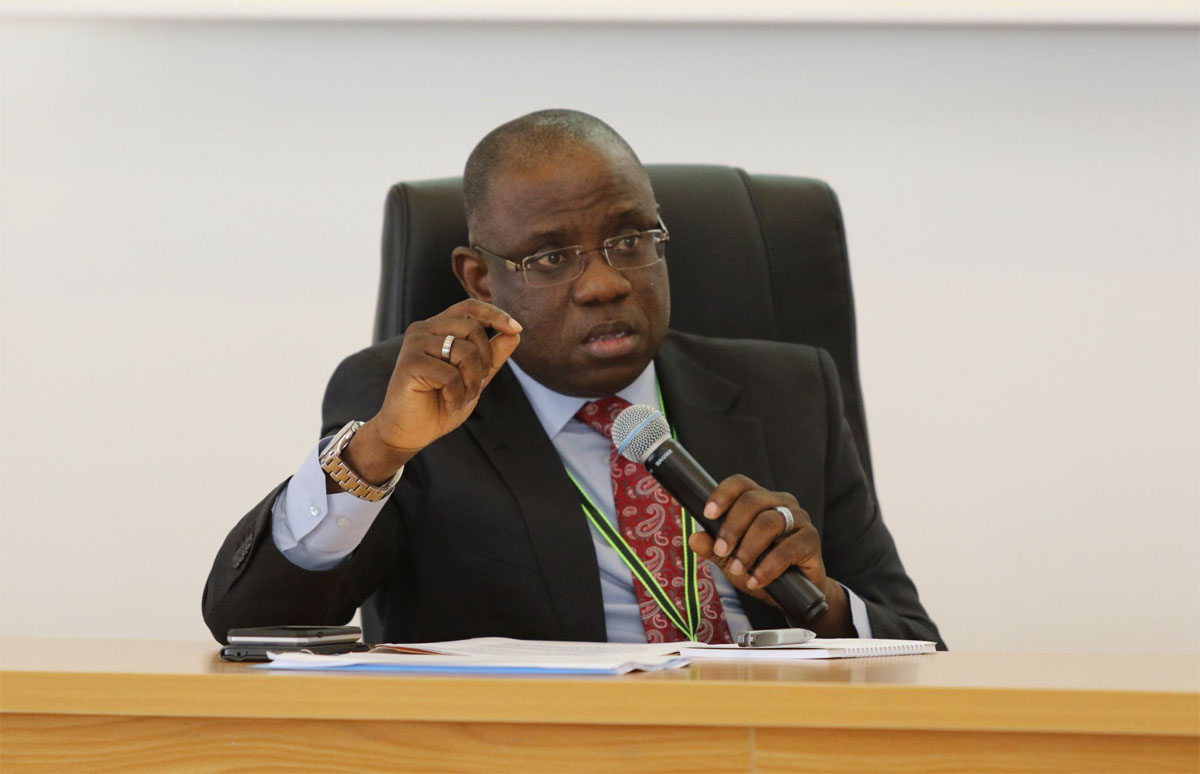
NNPCL: Ojulari’s ambitious five-year $60bn investment agenda
On Thursday, the Nigerian National Petroleum Company Limited (NNPCL) unveiled an ambitious five-year growth and development agenda that will see it attracting $30 billion investments by 2027 and $60 billion by 2030. Group Chief Executive Officer (GCEO), Bayo Ojulari, who assumed leadership of the NNPCL just two weeks ago on April 4, disclosed this and more to members of staff during a town hall meeting held at the NNPC Towers in Abuja. What happened that day can be described in other words as the unveiling of the agenda of the new sheriff at the NNPCL and the direction which he wants the national oil company to go in terms of focus, vision and developmental plans under his watch.
If the 48 year old national oil company, founded on April 1, 1977 has been crawling all these years, it has now announced its readiness not just to start walking but get into running mode, preparatory to flying.
In a detailed press statement signed by the Chief Corporate Communications Officer, Olufemi Soneye and made available to newsmen, Ojulari, the new set man at NNPCL was as clear and emphatic as he could possibly be when he declared that the NNPC Ltd under his stewardship aims to attract sectorial investments worth $30 billion by 2027 which it will ultimately scale up to $60 billion by 2030; raise crude oil production to over two million barrels per day which it hopes to sustain through 2027 and attain three million by 2030; expand refining output to 200kbpd by 2027, and 500kbpd by 2030; grow gas production to 10bcf per day by 2027, and 12bcf by 2030 and deepen energy access and affordability for all Nigerians. This is certainly sweet music to the ears.
o avoid sounding as if he would simply wave some magic wands to achieve these lofty targets, Ojulari spelt out what must be done to arrive at the Promised Land. According to him, the company will be focusing on reconfiguring its business structure for agility and value creation; conducting independent value assessments to inform data-driven decisions; enforcing a robust performance management framework; building transparent, value-aligned partnerships with all stakeholders and most critically, taking control of its narrative.
The GCEO was meticulous in explaining the imperativeness of pursuing the company’s bold and ambitious agenda. Ojulari declared that the targets are not just metrics, but indicators of hope, jobs, industrial growth, and energy security for millions of Nigerians.
Describing NNPC Ltd as a renewed, forward-facing, and future-ready organisation that is proudly leading Nigeria’s energy transformation, Ojulari declared that “it’s time we tell our story—one of innovation, reform, and national pride.”
In what sounds like a new dawn at the NNPCL, Ojulari challenged the staff to be proud of NNPC Ltd’s recent transformation, stressing that the next journey to becoming a fully-fledged limited liability company will require a collective drive towards making NNPC more transparent, profitable and accountable.
READ ALSO:
- Osimhen to rake in N136bn from Man United
- U20 AFCON: Flying Eagles tackle Young Pharaohs in friendly
- Our states under bandits siege, forests taken over – Benue, Plateau govs
Ojulari then made a solemn pledge to give all employees the space to thrive and be able to outperform competitors in the oil industry, at least in Nigeria. “We will provide the best combination where the experienced and the young will both thrive towards achieving our set targets,” he assured.
He also did not overlook the work environment as he promised that his management will deepen collaboration with the company’s in-house and national unions to build a stronger, trust-based relationship that reflects shared purpose and mutual respect. He also called on all staff to lead with integrity, act with urgency, while bringing their very best to the table.
“We recognize that our greatest asset is our people. Our success will be powered by empowered employees. As such, we are fully committed to creating a workplace where everyone is valued, motivated, and inspired to thrive. Together, we will build a high-performing, globally competitive NNPC Ltd that is proudly Nigerian and proudly world-class,” Ojulari stated.
He vowed to pursue the company’s bold ambition and build an NNPC that will be the pride of all Nigerians.
“We stand at the gateway of a new era—one that demands courage, professionalism, and a relentless drive for excellence. The task before us is great, yet the opportunity to redefine Nigeria’s energy future is even greater. Now is the time to turn our transformation promise into performance,” Ojulari submitted.
Considering the pre-eminent position the NNPCL occupies in driving of the Nigerian economy, it would not be out of place to say that the appointment of Ojulari as the new GCEO of the national oil coy happened at the right time and marks a pivotal moment for Nigeria’s oil and gas sector. With a bold plan to attract $60 billion in investments over the next five years, Ojulari’s leadership is poised to significantly impact the nation’s economy, particularly in the context of President Bola Tinubu’s ambitious vision of transforming Nigeria into a trillion dollar economy. Ojulari’s multifaceted agenda which includes increasing oil production to 3 million barrels per day (bpd), increasing NNPCL’s crude refining capacity, enhancing gas production, and fostering a culture of accountability and transparency within the organization are all steps that should yield the desired result if pursued with the same vigour and passion with which they were reeled out, and there is no doubt that he would want to leave his foot print in the sands of time at the NNPCL.
READ ALSO:
- (UPDATED) 5 dead, 13 injured in Gombe Easter Monday auto crash
- FG to close Ijora Bridge for repairs April 27
- Zamfara residents broke after paying N500m to bandits
Ojulari’s planned strategy of ramping up oil production is to ensure that the NNPCL is able to not only meet domestic energy needs but also position Nigeria as a key player in the global oil market. This increase in production is essential for generating the revenue required to fund national development projects and social programs. Furthermore, it will create jobs and stimulate economic activities across various sectors, from transportation to manufacturing, thereby contributing to the overall growth of the economy.
In addition by prioritizing gas production, he aims to leverage the country’s vast reserves to meet both domestic and international demand. This focus on gas not only aligns with global energy transition trends but also provides an opportunity for Nigeria to continue to upscale its diversification of her energy portfolio. Increased gas production can lead to the establishment of gas-based industries, which can further drive economic growth and create employment opportunities.
An important point to note in Ojulari’s leadership philosophy is the emphasis on accountability and transparency. By fostering a culture of openness within NNPCL, he aims to rebuild trust with stakeholders, including investors, government agencies, and the public. This commitment to transparency is crucial for attracting the $60 billion in investments needed to realize his ambitious plans. Investors are more likely to commit capital to an organization that demonstrates integrity and a clear commitment to ethical practices. Moreover, accountability within the organization can lead to improved operational efficiency, reducing waste and enhancing profitability.
Staff motivation and welfare are also central to Ojulari’s agenda. Recognizing that a motivated workforce is essential for achieving organizational goals, he has vowed to implement initiatives that prioritize employee well-being and professional development. By investing in training and creating a conducive work environment, Ojulari aims to empower NNPCL employees to perform at their best. This focus on human capital development will not only enhance productivity but also foster loyalty and reduce human capital quick turnover, ultimately benefiting the organization and the economy at large.
Another critical aspect of Ojulari’s agenda is the plan to foster collaboration and dialogue with labor representatives. This approach certainly will engender a more harmonious and peaceful working environment, reducing the likelihood of industrial disputes that could disrupt operations and hinder progress.
What Nigerians are about to witness in Ojulari’s leadership at NNPCL promises to be a comprehensive and forward-thinking approach to the challenges facing Nigeria’s oil and gas sector. His plans to attract significant investment, increase production, and foster a culture of accountability and employee welfare are certainly essential if as a major player in the nation’s economy, President Bola Tinubu’s vision for a trillion dollar economy within a decade is to be realised. If he can effectively execute this vision, Ojulari certainly will not only transform NNPCL but also contribute significantly to Nigeria’s economic growth and development.
NNPCL: Ojulari’s ambitious five-year $60bn investment agenda
Opinion
Tinubu’s Lagos-centric Yorubaization of Nigeria, By Farooq Kperogi

Tinubu’s Lagos-centric Yorubaization of Nigeria, By Farooq Kperogi
Last week, in response to mounting, difficult-to-controvert, empirically impregnable accusations that President Bola Ahmed Tinubu disproportionately favors his Yoruba ethnic group in consequential federal appointments, the presidency circulated a list of Tinubu’s appointments to countermine the firmly fixed national narrative of Tinubu’s unexampled ethnocentrism but was compelled to withdraw it because it was embarrassingly error-ridden and factually inaccurate.
Sunday Dare, the President’s Media Adviser on Media and Public Communication, tweeted on April 10 that the presidency had “noticed a number of errors in the list of appointments tweeted,” said they were “sorry,” and that they would “provide an updated list later.”
More than a week later, we haven’t seen the updated list that Dare promised, which will supposedly show that, in spite of incontestable evidence to the contrary, Tinubu’s appointments reflect fairness to the ethnic and regional complexities of Nigeria and that the Yoruba people don’t dominate appointments and control the commanding heights of the economy.
Interestingly, while the presidency is still updating its list and eating humble pie, a more damning list of Tinubu’s appointments has emerged. It is longer and shows an even more indefensibly insidious, not to mention unexampled, ethnocentric capture of the major levers of government.
Again, while we are awaiting the updated list of Tinubu’s appointments that shows evidence of a fair distribution of federal appointments, the government chose to undermine itself and provide additional ideational ammunition for his critics who say he is beholden to advancing the unfair dominance of his ethnic group.
On April 16, the administration announced the formation of an eight-member committee to oversee preparations for the national census. Of the eight, five were Yoruba. In a country comprising over 500 ethnic groups, such a configuration reflects a troubling insensitivity to the symbolic and political weight of representation, especially in a matter as contentious and identity-laden as a national headcount.
The exclusion of the northeast, southeast, and south-south from the committee cannot be dismissed as oversight. Nor can the disproportionate Yoruba presence be defended as incidental. The demographic sensitivities surrounding census exercises in Nigeria are historically fraught.
That the president’s team would assemble a committee so lopsided at such a politically volatile time betrays either a stunning lack of political judgment or a deeper confidence that no consequence will follow such overt ethno-regional privileging. Either way, the signal is unmistakable and deeply corrosive.
Equally emblematic was the decision to have the president’s Chief of Staff, Femi Gbajabiamila — a fellow Yoruba and an unelected official whose role has no constitutional standing — inaugurate the committee. This move, while procedurally permissible, was laden with semiotic overreach.
READ ALSO:
- Nigerian Army appoints Onyinyechi Anele as first female spokesperson
- Youths attack Fulani settlement, accuse residents of aiding bandits
- Obi is a social media candidate, can not win election – Wike
The constitutionally designated deputy of the president, Vice President Kashim Shettima, a northerner, was bypassed despite being present in the country. The optics communicate the message of an informal inner circle displacing formal constitutional roles, with ethnicity as a defining axis of inclusion and exclusion.
For an administration straining excessively hard to convince a skeptical nation that the evidence of ethnic bigotry in governance that stares them in the face isn’t what they think it is, gestures like this do not merely raise questions; they answer them in ways that deepen cynicism and confirm suspicions.
I think honchos of the Tinubu administration shoot themselves in the foot and expose themselves to ridicule when they try to defend the administration’s Yoruba-centric favoritism because their rhetoric is often hysterically at variance with the evidence.
They have two options. The first option is silence. There is more dignity in silence than lies, easily refutable lies. It’s better to be thought a fool, as the saying goes, than to open your mouth and remove all doubt.
The second option is to be bold and point out that Tinubu is merely expanding the ethnocentric path that Buhari paved. In several previous columns where I railed against the Arewa-centric favoritism of Buhari’s appointments, I repeatedly warned that Buhari’s southern successor would expand on his bigotry and that defenders of Buhari’s favoritism who insulted me would have no moral pedestal to stand on when that happened.
That time has come. To be frank, I am enjoying seeing people who defended, explained away, or ignored Buhari’s favoritism (because they imagined that he would be in power for ever) squirming and complaining of Tinubu’s more expansive, unapologetic ethnic capture of the levers of government.
When you initiate an action, you can’t determine the nature and contour of the reaction. Saying Buhari was less exclusionary than Tinubu is now is a weak charge. Buhari shouldn’t have started it, and the people who defended him or looked away should have known that this moment would come.
Of course, the people who benefit from or who defend Tinubu’s unabashed Yoruba-centrism should be aware that, like Buhari’s Arewa-centrism, it also has an expiration date, and that the successor to it may be worse than it.
Defenders of the narrow-mindedness of the Tinubu regime should also be aware of other unintended consequences of their ethnic triumphalism. Just like Buhari has caused the Fulani (including poor, innocent ones) to be reviled all over Nigeria, everyday Yoruba people who also suffer the consequences of Tinubu’s economic policies, will be targets of transferred aggression.
READ ALSO:
- Kyiv receives 909 bodies of Ukrainian soldiers
- APC to Kwankwaso: Apologise to Tinubu, Shettima before joining our party
- Police arrest 3, recover after busting Imo IPOB terror hideout
Like the Fulani, the Yoruba may become the objects of undeserved and unearned ethnic hate on account of the president’s inability to see beyond this ethnic enclave in appointments and symbolic actions.
It doesn’t matter that, like a Yoruba friend tells me each time this issue comes up, Tinubu’s outward Yoruba-centrism actually masks a more exclusionary Lagos-centrism. He says most of the Yoruba people Tinubu appoints to important positions have connections to Lagos.
I don’t doubt him. In fact, in a January 24, 2024, column titled, “North and Tinubu’s Back-to-Lagos Moves,” I made that point.
“With a few notable (and in some cases unavoidable) exceptions, Tinubu’s government is largely the re-enactment of his time as the governor of Lagos,” I wrote. “It is, for all practical purposes, an unabashed Lagos-centric Yorubacracy. To be fair, though, with the possible exception of Olusegun Obasanjo’s administration, all civilian regimes since 1999 have been insular ethnocracies.”
I should also point out that in spite of appearances to the contrary, many well-informed, cosmopolitan Yoruba people are embarrassed by Tinubu’s unabashed favoritism toward Yoruba people at the expense of other ethnic groups.
For example, when Tinubu was considering Bayo Ojulari as the Group Chief Executive Officer of the Nigerian National Petroleum Company Limited, it was a Yoruba man who is close to the Tinubu power orbit, who reached out to me, giving me the privilege to be the first person to break the news months before it was officially confirmed.
In my widely shared December 28, 2024, column titled, “Tinubu’s Buharization of the NNPC,” I wrote the following:
“Ironically, this column was inspired by a well-regarded Yoruba supporter of President Bola Ahmed Tinubu who is worried, in fact embarrassed, by the optics of what he says is Tinubu’s relentless Yorubacentric take-over of the Nigerian National Petroleum Company (NNPC).
“His concern wasn’t just partisan discomfort; it was a profound unease about how this nepotistic approach undermines national cohesion.”
However, after I discovered that Ojulari is a northern Yoruba, not a Southwestern Yoruba as my source had thought, I wrote a follow-up column (see “NNPC and Fresh Perspectives on Ojulari’s Identity,” January 04, 2025) to clarify my position and to argue that it’s disingenuous to deny the northern identity of northern Yoruba people only when they benefit from the representational benefits of being northerners.
As I have argued many times in the past, appointments are the symbolic conduits through which citizens relate to governments. That is why representational justice is crucial for a complex, multi-ethnic country like Nigeria.
However, since our national leaders have historically chosen to find comfort only in their ethnic and regional cocoons and to abandon the hard task of building bridges and integrating our disparate but entirely collapsible identities, we will continue to sink deeper and deeper into the low watermarks of exclusion and bitter divisions.
Farooq Kperogi is a renowned Nigerian columnist and United States-based Professor of Journalism
Tinubu’s Lagos-centric Yorubaization of Nigeria, By Farooq Kperogi
-

 metro3 days ago
metro3 days agoRivers: Tinubu meets with Fubara, may lift his suspension
-

 metro2 days ago
metro2 days agoI’m not in supremacy battle with Ooni, says new Alaafin
-

 Entertainment1 day ago
Entertainment1 day agoP-Square: Jude Okoye freed after two months detention
-

 metro7 hours ago
metro7 hours agoOmokri : How Tinubu’s political mastery started with Abiola, says El-Rufai, Obi’s forces can’t stop him
-

 metro3 days ago
metro3 days agoBandits attack Kwara North, kill vigilante, six others
-
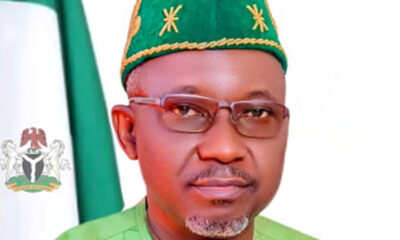
 Business2 days ago
Business2 days agoNigeria’s gas production increases by 15.6% to 227,931.65 mscf
-
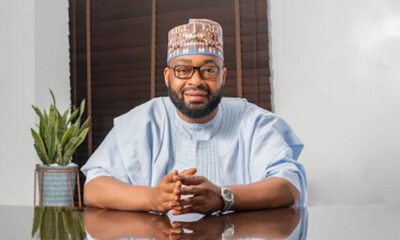
 metro1 day ago
metro1 day agoNiger Gov Bago makes U-turn on dreadlocks ban after backlash
-
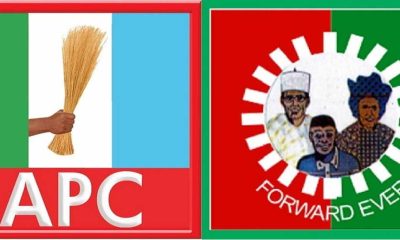
 Politics1 day ago
Politics1 day agoLabour Party collapses into APC in Plateau

